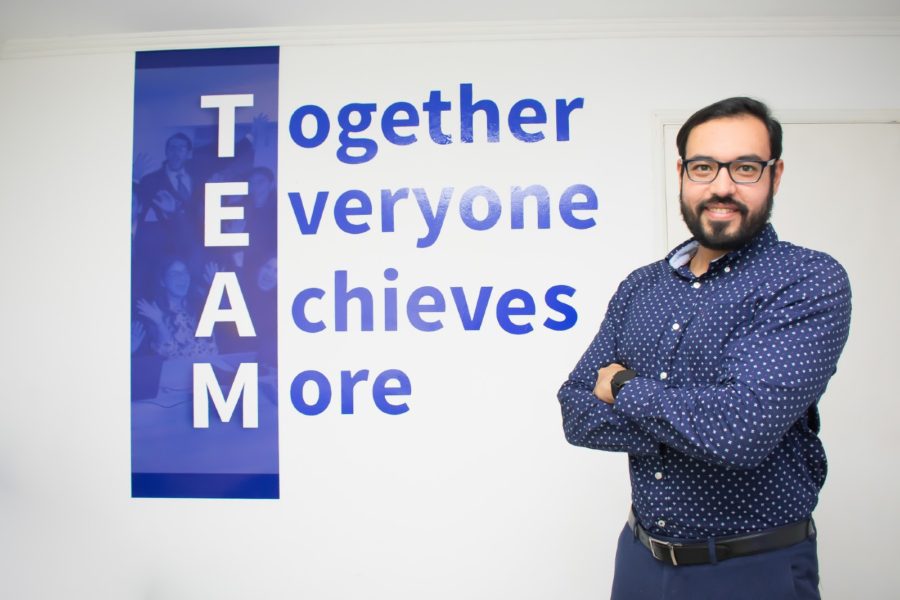Since COVID-19 hit, most companies and workers found out about the many benefits of working remotely. Now, in 2022, both of us, employees and companies, should take advantage of these benefits to further improve the way we work and do business together.
If you follow us on social media you already know that we offer in-person, hybrid, and remote job positions, depending on the work required. That’s why, if you are looking to improve your remote work skills, you’ve come to the right place. We have tons of articles that can help you get a better insight into remote & hybrid work, their pros and cons, and what you’ll need to land the job you’re looking for.
Before going through the skills, to land the job of your dreams, you need to be fully aware of why you want a remote job and if you are truly prepared to have one.
Why Work Remotely?
Before applying for a remote job, you should have all your bases covered. It’s highly advised to be prepared and have:
- A dedicated workspace.
- Good internet connection (with backups)
- The necessary equipment.
- Knowledge of management apps and tools to facilitate online collaboration.
- Have the soft skills required for the position.
However, don’t worry if you don’t have all of these requirements from the get-go. Every person is going through their own journey, the important thing is that you set your goals and go through them.
We are proud of being able to help our freelancers have their own remote workspaces. How do we do this? Each of our freelancers, depending on the job, is given their own work pc or laptop with tools such as a mouse, headphones, a second monitor, and/or everything they might need to get the job done. These tools are free to take home once they have secured a safe home workspace.

Also, with our monthly Freelancer of The Month reunions, we strive to teach our freelancers new soft skills while discussing together their importance, brainstorming ideas, and answering questions. We are more than happy to be of help to you in your journey as a freelancer.
Once you feel prepared to have your first remote job, you need to understand why you want it. When you are asked this question in an interview, “because it is more comfortable” won’t really be a valid answer. Remember that, in interviews, your goal is to know more about the company and impress your interviewer. So, to land your first remote job you should answer something like this:
“I believe that working remotely highly improves employee morale and productivity. When a company offers that flexibility, it allows its employees to have a better work-life balance. Hence, allowing them to be more creative, well-rested, and more inspired to do a good job. I am looking for a company that aligns with that mindset, and I heard great things about this company, that’s why I reached out to you.”
For me, this is just interview lingo for “because is more comfortable”, but learning how to communicate effectively is something that we must understand and acquire in order to land the job of our dreams.
For more tips on how to nail your next interview check out: What Should YOU Ask A Job Interviewer & 8 Biggest Interview Red Flags
“What Does It Take To Land My First Remote Job?”
This is a question we often get asked on our social media, and since our Recruitment & HR Teams did a Q&A Live on Instagram recently, I thought that this was the best chance to talk further on the topic and answer some questions with a little bit more depth.
So, I had a small chat with our Recruitment & HR Teams to give you some insight into the skills you’ll need to land your first remote job with Freelance Latin America.
The overall consensus was that the best candidate should have a set of practical and soft skills to instantly be considered for further interviews or job positions. As for practical skills, I mean something that you surely already have, such as effective communication, the ability to work in teams, project management, etc but with a twist!
If you want to work remotely you’ll have to learn how to translate those skills into the remote work setting. That’s when being tech-savvy, and knowing how and which tools to use comes to play.
Key Practical Skills For Remote Work:
1. Get Used to Remote Project Management Tools
Let’s face it, it’s easier to know what you should be working on and when it’s due when you are working in an office. You can simply ask the coworker next to you, run with someone in the halls, and ask them quick questions, or there might even be notes and reminders in key places on the office walls or on your department’s whiteboards.
This doesn’t mean that we can’t get something similar working remotely, it just means that we are not used to the remote setting and we have to learn to use project management apps and tools that will help us to get more organized and more in contact with your team.

This is done through tools like:
- Trello
- Asana
- Monday
- Basecamp
And many others. Getting a hand with these tools and mastering them will be crucial to staying organized and on track, two things that will improve your chances of getting hired for a remote job.
2. Learn How to Collaborate Virtually
The fact that your coworkers are not working near or next to you doesn’t mean you can’t ask them questions when in doubt. To truly master remote working you’ll have to get comfortable with using and reaching out to your coworkers through tools like:

- Slack.
- Zoom.
- Teams.
- Email.
- And other project management tools.
All of your suggestions, feedback, and brainstorming sessions will go through tools like these ones. So, try to get used to these tools and think about how to elaborate your thoughts effectively through a computer screen without coming off as dismissive or passive-aggressive, things that can be easily misinterpreted when you are not working face-to-face.
Learn to respect online boundaries and when, where, and how you should communicate with someone using online tools.
3. Communicate Effectively Through Online Tools
This connects perfectly with the previous point.
Slack, Zoom calls, Microsoft Teams, Emails. From the beginning, you should know which communication channels your organization uses and how. You should know what’s the best way to communicate with your coworkers and superiors, where to leave a message that should be read the following day, and what’s the best way to ask for advice and support in case of doubts or in case anything happens.
Communication within an organization is extremely important, and much more so when the company you work for is fully remote or hybrid. Since you are not seeing each other face to face, you need to be 100% aware of when and where you can reach out to each other to not break any boundaries and communicate as efficiently as possible.
If you are working with people all around the world is common for the company to have an asynchronous communication system, in which you and your team will send messages without expecting an immediate response.
On the other hand, this means you’ll need to be as specific as possible when explaining project details, concerns, and questions you may have in a well-written message through the corresponding channel.
I advise you to create boundaries between work and your personal life and not send/not allow your coworkers to send work-related messages through your personal phone number or email and always keep clear work-related communication throughout its respective work channels.
You can learn more about this topic by checking out Building Connections in a Hybrid Workplace & Setting Boundaries for Digital Communication
4. Get Comfy With Video Conferencing
All of your work-related social interactions will now happen either through chats or video calls, and the best way to get to know your new teammates and get some “face time” is by video conferencing.
Your supervisors and managers will frequently use virtual meetings to convey messages, motivate people, and share weekly, monthly, and yearly goals. They are also super useful to make sure everyone is still working on the same page.
That being said, since now your new playing field will be these online calls, you should be comfortable expressing your thoughts on camera. As I said at the beginning of the article, you should also be prepared by having the right tech on your side, camera, microphone, and a fast and reliable internet connection so you are not cutting in and out of the calls or unable to listen to the other speakers.
You can download apps like Zoom, teams, or Google meets right now to start to get a feel for them and check the many uses and tools that you’ll have at your disposal.
In short…
Having these skills means that you won’t need much training to get up and running on your new job, also meaning that you can impress hiring managers and position yourself as a top candidate for remote roles.
Remember that most of these apps and tools are free, so you can start checking them out right away and watch some tutorials, tips, tricks, and everything that you feel might help you to understand them better.

All remote jobs will require you to use these tools, and having them listed on your resume will surely help you get the job you’re looking for!
However, remember that working remotely is not only about the tools you know how to use, it is also about the skills and interpersonal skills you possess. How good you are at organizing and managing your time on your own, multitasking, and even the way you communicate regularly are aspects that your job interviewer is going to be evaluating.
That’s why if you already developed your practical skills, you’ll also need to take care of your interpersonal skills; also called, soft skills:
Key Soft Skills For Remote Work:
Soft skills are non-technical skills that are not related to what you do for work, but to how you work. Not even the most qualified candidate can succeed in the workplace without having soft skills, they can make you shine, stand out from your colleagues, and get you all the success you want.
These skills include how you communicate with colleagues, how you achieve targets, how you solve problems, how to respond to a situation and many more. They are the most basic yet vital part of the working culture.
Let’s have a look at the key soft skills you need for remote work:
1. Active Communication:
Being an active or effective communicator is a skill that will help you achieve success in all areas of your life, whether personal or professional. Mastering communication skills will help you be more confident and optimistic, two character traits that can enable you to accomplish your goals.
Communicating can be natural for some people, but rather complicated for others. If you fall into the second category, these tips will help you to start developing your communication skills and, in consequence, start climbing ladders at your workplace:

- Identify your objectives. Understanding your objectives will help you shape your communication style and make you more effective. Try asking yourself questions like: “What do I hope to accomplish?”, “short or long term?”, “How will I know that I communicated successfully?”
- Listen Actively. If you want people to listen to you, you need to listen to them. Don’t get so focused on what you’re saying that you miss their important comments, emotions, and reactions. When both parties are actively listening to each other communication is far more effective.
- Check your body language. Without realizing it, your body language can send a stronger message than your words. There are signs that show whether you are willing to have an open conversation or not before you’ve said a single word.
- Know your audience. Adjusting how and what you say to match your audience will improve your communication skills. Remember that the same speech, conversation, or sales pitch won’t succeed with every audience, you should modify your language for each group so that you’re not being condescending or speaking in a way that your audience can’t understand.
- Pace Yourself. Pay attention to how quickly you’re speaking and whether your audience appears to be processing what you’re saying. Slow down if necessary, and vary the volume and rhythm of your speech to hold their attention. Remember to repeat important points when necessary, the goal is that the audience understands what you’re saying, not just to say words out loud.
- Choose the Right Time. There’s always a right time for everything, and an active person knows how to take advantage of these opportunities. At the end of the day, timing is a big factor in successful communication. So, whether you’re planning to deliver good or bad news or simply presenting a new idea that requires energy and focus, be aware of your audience’s mindset.
- Be Clear. People appreciate clear and direct information. You don’t have to spend too much time setting up your ideas or requests and try to communicate your needs more clearly. By doing this, you’ll not only avoid misunderstandings, but also you will earn respect through your honesty and clarity.
Remember, there’s a better chance of accomplishing your goals when you communicate effectively, and these tips will be the start of your journey to being a better communicator.
2. Organizational Skills:
Organizational skills can help you solve problems, plan projects, collaborate better, and maintain an organized life. These skills are most effective when rooted in your daily routine, and organizations often search for quality employees who possess strong organizational skills because they demonstrate your dynamic qualities as an employee.
Developing organizational skills is something that happens slowly because you will be gradually introducing them to your workday routine. After some time has passed, you will start to notice an increase in efficiency throughout your projects and routine.
These are a few ways you can get started to develop organizational skills that you can use regularly at work:

- Create a clean workspace. The first step will always be to declutter your digital and physical workspace area. Get rid of any unnecessary objects or documents, and only maintain close to you what is necessary to complete your daily responsibilities. With fewer distractions around you, you might find that it’s easier to focus on the task at hand.
- Identify goals to meet. As in the previous step, you’ll need to identify the goals you would like to meet. Your goals may be goals that are assigned by yourself or your superiors, or they can even be self-improvement goals you set for yourself. List them down and note how long each goal may take to accomplish so that you can better organize your schedules by…
- Building a to-do list. Once you establish a goal, build a to-do list to establish the necessary steps to achieve it. Try starting with a larger project or goal. Evaluate how long it might take to estimate a final deadline, break it up into smaller tasks, and write them down in a list. You might also assign due dates to your tasks to help you stay on track. This can help you complete larger projects without feeling overwhelmed.
- Organize your materials. To increase productivity and remain organized, store documents in files that are clearly labeled and easy to find. The goal is to establish a system where documents are quick and easy to retrieve, so avoid creating too many folders. Instead, create folders based on broad categories like “team meetings,” “quarterly reports,” or “training documents,” and add subfolders within those categories if necessary.
- Reward yourself regularly. Build a reward system for yourself. When you acknowledge your achievements, even in small ways, it can help you build motivation to complete each project. This can build a productive work cycle for yourself and can encourage you to remain organized.
- Maintain a healthy work-life balance. Your brain can process information better when you give it some rest and allow yourself to also focus on non-work-related activities. Give yourself some time to rest, and once you return to work after resting your mind, you may find that you feel better prepared to be productive and organized throughout your day as you work toward your goals.
3. Time Management:
Time management is the process of organizing and managing your time. It means to work smart, not hard, and to focus your time on the things that are most important to you. Good time management helps you schedule your time between important activities, enabling you to achieve greater levels of performance and productivity. Achieving bigger results in a short period of time leads to a decrease in your stress and gives you more time to spend with the people that matter the most to you.
There are many benefits that come with improving your time management skills, but these are the most important ones:
- Less stress. Good time management means meeting tight deadlines and planning your time. And not having problems when meeting deadlines will cause a significant decrease in your stress levels and increase your confidence. It will also allow you to improve your sleep schedule and create a better work-life balance.

- More free time. When you have greater time freedom, you can focus your time on setting and achieving your biggest goals. It also ensures you have more time to spend with family and friends, deepen relationships, and pursue new hobbies. It allows you to find and follow your purpose in life.
- Greater focus: Remember, good time management doesn’t mean expanding your to-do list and working longer, it means working smarter, not harder. Effective time management increases your focus and improves your productivity, allowing you to capture bigger opportunities and spend more time on the projects, goals, and people that truly matter.
- Less procrastination: It’s easy to procrastinate when you don’t know how to manage your own time, and when you aren’t clear and focused on your goals. Managing your time ensures you feel in control of your workload and helps to stop procrastination.
- Increased energy: Increased energy helps you focus on your most important work. When you work longer and harder, your energy levels can drop, and you feel tired all the time. At this time, it’s easy to feel overwhelmed and start procrastinating, that’s why is important to take regular breaks throughout the day to keep your energy levels high and increase productivity.
If you are interested in improving your time management skills, there are three skills that you need to develop, and those are: Awareness, Arrangement, and Adaptability.
Awareness to start thinking realistically about your time, and understand that it is a limited resource. Arrangement to improve your organizing and planning skills, and schedule activities and tasks effectively. And lastly, adaptability, to be able to adjust to interruptions or changing priorities.
To learn more about how to improve your time management skills check “3 Vital Skills to Improve your Time Management”. In that article, we go into full detail about what you need to do to better manage your own time.
It might seem like much, but by dedicating a few hours of your time per day, I assure you that you’ll be able to develop any type of skill that you are aiming for, whether they are technical, practical, or soft skills.
Once you have developed these skills I assure you that you’ll nail each and every interview that you have in the future! You can also check out our available positions right here.
See more articles by Ender Cárdenas






